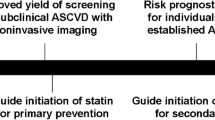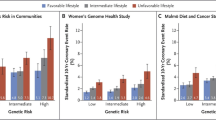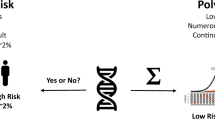Abstract
Purpose of Review
The purpose of this review is to understand the conceptual basis and implications of polygenic risk scores (PRS) in assessing risk of future coronary artery disease (CAD).
Recent Findings
Genetic information from the USA and beyond has been pooled together to create population-based biobanks, composed of millions of genotyped individuals, which have helped further our understanding of the relationship between single nucleotide polymorphisms (SNPs) and CAD. Contemporary PRS composed of millions of SNPs now serve as the gold standard and have been evaluated in several cohort studies to predict risk of CAD and potentially help guide pharmacotherapy.
Summary
The development of PRS has enhanced our understanding of the relationship between genes and disease, thereby facilitating CAD risk prediction. While certain constraints currently limit their utility in clinical practice, further refinement of this tool will enable clinicians to more fully understand genetic risk and improve preventive care.
Similar content being viewed by others
References
Papers of particular interest, published recently, have been highlighted as: • Of importance •• Of major importance
MacArthur J, Bowler E, Cerezo M, Gil L, Hall P, Hastings E, et al. The new NHGRI-EBI catalog of published genome-wide association studies (GWAS catalog). Nucleic Acids Res. 2016;45(D1):D896–901. https://doi.org/10.1093/nar/gkw1133.
Erdmann J, Kessler T, Munoz Venegas L, Schunkert H. A decade of genome-wide association studies for coronary artery disease: the challenges ahead. Cardiovasc Res. 2018;114(9):1241–57. https://doi.org/10.1093/cvr/cvy084.
Herapath CE, Perry CB. The coronary arteries in a case of familial liability to sudden death. Br Med J. 1930;1(3614):685–7. https://doi.org/10.1136/bmj.1.3614.685.
Gertler MM, Garn SM, White PD. Young candidates for coronary heart disease. J Am Med Assoc. 1951;147(7):621–5. https://doi.org/10.1001/jama.1951.03670240005002.
Lehrman M, Schneider W, Sudhof T, Brown M, Goldstein J, Russell D. Mutation in LDL receptor: Alu-Alu recombination deletes exons encoding transmembrane and cytoplasmic domains. Science. 1985;227(4683):140–6. https://doi.org/10.1126/science.3155573.
Soria LF, Ludwig EH, Clarke HR, Vega GL, Grundy SM, McCarthy BJ. Association between a specific apolipoprotein B mutation and familial defective apolipoprotein B-100. Proc Natl Acad Sci. 1989;86(2):587–91. https://doi.org/10.1073/pnas.86.2.587.
Abifadel M, Varret M, Rabes JP, Allard D, Ouguerram K, Devillers M, et al. Mutations in PCSK9 cause autosomal dominant hypercholesterolemia. Nat Genet. 2003;34(2):154–6. https://doi.org/10.1038/ng1161.
Berberich AJ, Hegele RA. The complex molecular genetics of familial hypercholesterolaemia. Nat Rev Cardiol. 2019;16(1):9–20. https://doi.org/10.1038/s41569-018-0052-6.
Khera AV, Won HH, Peloso GM, Lawson KS, Bartz TM, Deng X, et al. Diagnostic yield and clinical utility of sequencing familial hypercholesterolemia genes in patients with severe hypercholesterolemia. J Am Coll Cardiol. 2016;67(22):2578–89. https://doi.org/10.1016/j.jacc.2016.03.520.
Gidding SS, Champagne MA, SDd F, Defesche J, Ito MK, Knowles JW, et al. The agenda for familial hypercholesterolemia. Circulation. 2015;132(22):2167–92. https://doi.org/10.1161/CIR.0000000000000297.
Dudbridge F, Gusnanto A. Estimation of significance thresholds for genomewide association scans. Genet Epidemiol. 2008;32(3):227–34. https://doi.org/10.1002/gepi.20297.
Musunuru K, Kathiresan S. Genetics of common, complex coronary artery disease. Cell. 2019;177(1):132–45. https://doi.org/10.1016/j.cell.2019.02.015.
Roberts R, Stewart AF. Genes and coronary artery disease: where are we? J Am Coll Cardiol. 2012;60(18):1715–21. https://doi.org/10.1016/j.jacc.2011.12.062.
McPherson R, Pertsemlidis A, Kavaslar N, Stewart A, Roberts R, Cox DR, et al. A common allele on chromosome 9 associated with coronary heart disease. Science (New York, NY). 2007;316(5830):1488–91. https://doi.org/10.1126/science.1142447.
Helgadottir A, Thorleifsson G, Manolescu A, Gretarsdottir S, Blondal T, Jonasdottir A, et al. A common variant on chromosome 9p21 affects the risk of myocardial infarction. Science. 2007;316(5830):1491–3. https://doi.org/10.1126/science.1142842.
Samani NJ, Erdmann J, Hall AS, Hengstenberg C, Mangino M, Mayer B, et al. Genomewide association analysis of coronary artery disease. N Engl J Med. 2007;357(5):443–53. https://doi.org/10.1056/NEJMoa072366.
Deloukas P, Kanoni S, Willenborg C, Farrall M, Assimes TL, Thompson JR, et al. Large-scale association analysis identifies new risk loci for coronary artery disease. Nat Genet. 2013;45(1):25–33. https://doi.org/10.1038/ng.2480.
Sudlow C, Gallacher J, Allen N, Beral V, Burton P, Danesh J, et al. UK Biobank: an open access resource for identifying the causes of a wide range of complex diseases of middle and old age. PLoS Med. 2015;12(3):e1001779. https://doi.org/10.1371/journal.pmed.1001779.
Aragam KG, Natarajan P. Polygenic scores to assess atherosclerotic cardiovascular disease risk. Circ Res. 2020;126(9):1159–77. https://doi.org/10.1161/CIRCRESAHA.120.315928.
Lambert SA, Abraham G, Inouye M. Towards clinical utility of polygenic risk scores. Hum Mol Genet. 2019;28(R2):R133–r42. https://doi.org/10.1093/hmg/ddz187.
Natarajan P. Polygenic risk scoring for coronary heart disease: the first risk factor. J Am Coll Cardiol. 2018;72(16):1894–7. https://doi.org/10.1016/j.jacc.2018.08.1041.
Kathiresan S, Melander O, Anevski D, Guiducci C, Burtt NP, Roos C, et al. Polymorphisms associated with cholesterol and risk of cardiovascular events. N Engl J Med. 2008;358(12):1240–9. https://doi.org/10.1056/NEJMoa0706728.
Ripatti S, Tikkanen E, Orho-Melander M, Havulinna AS, Silander K, Sharma A, et al. A multilocus genetic risk score for coronary heart disease: case-control and prospective cohort analyses. Lancet. 2010;376(9750):1393–400. https://doi.org/10.1016/s0140-6736(10)61267-6.
Qi L, Ma J, Qi Q, Hartiala J, Allayee H, Campos H. Genetic risk score and risk of myocardial infarction in Hispanics. Circulation. 2011;123(4):374–80. https://doi.org/10.1161/circulationaha.110.976613.
Patel RS, Sun YV, Hartiala J, Veledar E, Su S, Sher S, et al. Association of a genetic risk score with prevalent and incident myocardial infarction in subjects undergoing coronary angiography. Circ Cardiovasc Genet. 2012;5(4):441–9. https://doi.org/10.1161/circgenetics.111.960229.
Thanassoulis G, Peloso GM, Pencina MJ, Hoffmann U, Fox CS, Cupples LA, et al. A genetic risk score is associated with incident cardiovascular disease and coronary artery calcium: the Framingham Heart Study. Circ Cardiovasc Genet. 2012;5(1):113–21. https://doi.org/10.1161/circgenetics.111.961342.
Khera AV, Chaffin M, Aragam KG, Haas ME, Roselli C, Choi SH, et al. Genome-wide polygenic scores for common diseases identify individuals with risk equivalent to monogenic mutations. Nat Genet. 2018;50(9):1219–24. https://doi.org/10.1038/s41588-018-0183-zThis study established the 6.6 million SNP PRS as the gold standard for genetic CAD risk prediction, which has been used in several other cohort studies.
Tada H, Melander O, Louie JZ, Catanese JJ, Rowland CM, Devlin JJ, et al. Risk prediction by genetic risk scores for coronary heart disease is independent of self-reported family history. Eur Heart J. 2016;37(6):561–7. https://doi.org/10.1093/eurheartj/ehv462.
Abraham G, Havulinna AS, Bhalala OG, Byars SG, De Livera AM, Yetukuri L, et al. Genomic prediction of coronary heart disease. Eur Heart J. 2016;37(43):3267–78. https://doi.org/10.1093/eurheartj/ehw450.
Khera AV, Chaffin M, Zekavat SM, Collins RL, Roselli C, Natarajan P, et al. Whole-genome sequencing to characterize monogenic and polygenic contributions in patients hospitalized with early-onset myocardial infarction. Circulation. 2019;139(13):1593–602. https://doi.org/10.1161/circulationaha.118.035658.
Mosley JD, Gupta DK, Tan J, Yao J, Wells QS, Shaffer CM, et al. Predictive accuracy of a polygenic risk score compared with a clinical risk score for incident coronary heart disease. JAMA. 2020;323(7):627–35. https://doi.org/10.1001/jama.2019.21782.
Goff DC Jr, Lloyd-Jones DM, Bennett G, Coady S, D’Agostino RB Sr, Gibbons R, et al. 2013 ACC/AHA guideline on the assessment of cardiovascular risk: a report of the American College of Cardiology/American Heart Association Task Force on Practice Guidelines. J Am Coll Cardiol. 2014;63(25 Pt B):2935–59. https://doi.org/10.1016/j.jacc.2013.11.005.
Elliott J, Bodinier B, Bond TA, Chadeau-Hyam M, Evangelou E, Moons KGM, et al. Predictive accuracy of a polygenic risk score-enhanced prediction model vs a clinical risk score for coronary artery disease. Jama. 2020;323(7):636–45. https://doi.org/10.1001/jama.2019.22241.
Khan SS, Cooper R, Greenland P. Do polygenic risk scores improve patient selection for prevention of coronary artery disease? JAMA. 2020;323(7):614–5. https://doi.org/10.1001/jama.2019.21667.
Kullo IJ, Jouni H, Austin EE, Brown SA, Kruisselbrink TM, Isseh IN, et al. Incorporating a genetic risk score into coronary heart disease risk estimates: effect on low-density lipoprotein cholesterol levels (the MI-GENES Clinical Trial). Circulation. 2016;133(12):1181–8. https://doi.org/10.1161/CIRCULATIONAHA.115.020109.
Khera AV, Emdin CA, Drake I, Natarajan P, Bick AG, Cook NR, et al. Genetic risk, adherence to a healthy lifestyle, and coronary disease. N Engl J Med. 2016;375(24):2349–58. https://doi.org/10.1056/NEJMoa1605086This study demonstrated that genetic risk of CAD can be attenuated by a healthy lifestyle.
Mega JL, Stitziel NO, Smith JG, Chasman DI, Caulfield MJ, Devlin JJ, et al. Genetic risk, coronary heart disease events, and the clinical benefit of statin therapy: an analysis of primary and secondary prevention trials. Lancet. 2015;385(9984):2264–71. https://doi.org/10.1016/S0140-6736(14)61730-X.
Natarajan P, Young R, Stitziel NO, Padmanabhan S, Baber U, Mehran R, et al. Polygenic risk score identifies subgroup with higher burden of atherosclerosis and greater relative benefit from statin therapy in the primary prevention setting. Circulation. 2017;135(22):2091–101. https://doi.org/10.1161/circulationaha.116.024436.
Marston NA, Kamanu FK, Nordio F, Gurmu Y, Roselli C, Sever PS, et al. Predicting benefit from evolocumab therapy in patients with atherosclerotic disease using a genetic risk score: results from the FOURIER trial. Circulation. 2020;141(8):616–23.
Damask A, Steg PG, Schwartz GG, Szarek M, Hagström E, Badimon L, et al. Patients with high genome-wide polygenic risk scores for coronary artery disease may receive greater clinical benefit from alirocumab treatment in the ODYSSEY OUTCOMES trial. Circulation. 2020;141(8):624–36.
Aragam KG, Dobbyn A, Judy R, Chaffin M, Chaudhary K, Hindy G, et al. Limitations of contemporary guidelines for managing patients at high genetic risk of coronary artery disease. J Am Coll Cardiol. 2020;75(22):2769–80. https://doi.org/10.1016/j.jacc.2020.04.027.
German C, Ahmad MI, Li Y, Soliman EZ. Relations between physical activity, subclinical myocardial injury, and cardiovascular mortality in the general population. Am J Cardiol. 2020;125(2):205–9. https://doi.org/10.1016/j.amjcard.2019.08.031.
Oliveri S, Ferrari F, Manfrinati A, Pravettoni G. A systematic review of the psychological implications of genetic testing: a comparative analysis among cardiovascular, neurodegenerative and cancer diseases. Front Genet. 2018;9:624. https://doi.org/10.3389/fgene.2018.00624.
Hindorff LA, Bonham VL, Brody LC, Ginoza MEC, Hutter CM, Manolio TA, et al. Prioritizing diversity in human genomics research. Nat Rev Genet. 2018;19(3):175–85. https://doi.org/10.1038/nrg.2017.89.
Reisberg S, Iljasenko T, Läll K, Fischer K, Vilo J. Comparing distributions of polygenic risk scores of type 2 diabetes and coronary heart disease within different populations. PLoS One. 2017;12(7):e0179238.
Kim MS, Patel KP, Teng AK, Berens AJ, Lachance J. Genetic disease risks can be misestimated across global populations. Genome Biol. 2018;19(1):1–14.
Bis JC, Kavousi M, Franceschini N, Isaacs A, Abecasis GR, Schminke U, et al. Meta-analysis of genome-wide association studies from the CHARGE consortium identifies common variants associated with carotid intima media thickness and plaque. Nat Genet. 2011;43(10):940–7. https://doi.org/10.1038/ng.920.
Peyser PA, Bielak LF, Chu JS, Turner ST, Ellsworth DL, Boerwinkle E, et al. Heritability of coronary artery calcium quantity measured by electron beam computed tomography in asymptomatic adults. Circulation. 2002;106(3):304–8. https://doi.org/10.1161/01.CIR.0000022664.21832.5D.
Severance LM, Contijoch FJ, Carter H, Fan CC, Seibert TM, Dale AM, et al. Using a genetic risk score to calculate the optimal age for an individual to undergo coronary artery calcium screening. J Cardiovasc Comput Tomogr. 2019;13(4):203–10. https://doi.org/10.1016/j.jcct.2019.05.005.
Levin MG, Kember RL, Judy R, Birtwell D, Williams H, Arany Z, et al. Genomic risk stratification predicts all-cause mortality after cardiac catheterization. Circ Genom Precis Med. 2018;11(11):e002352. https://doi.org/10.1161/circgen.118.002352.
Author information
Authors and Affiliations
Corresponding author
Ethics declarations
Conflict of Interest
Dr. German has no relevant disclosures. Dr. Shapiro reports the following Scientific Advisory Board activities: Alexion, Amgen, Esperion, Novartis, and Inozyme.
Human and Animal Rights and Informed Consent
This article does not contain any studies with human or animal subjects performed by any of the authors.
Additional information
Publisher’s Note
Springer Nature remains neutral with regard to jurisdictional claims in published maps and institutional affiliations.
This article is part of the Topical Collection on Coronary Heart Disease
Rights and permissions
About this article
Cite this article
German, C.A., Shapiro, M.D. Polygenic Risk Scores to Identify CVD Risk and Tailor Therapy: Hope or Hype?. Curr Atheroscler Rep 23, 47 (2021). https://doi.org/10.1007/s11883-021-00950-3
Accepted:
Published:
DOI: https://doi.org/10.1007/s11883-021-00950-3




